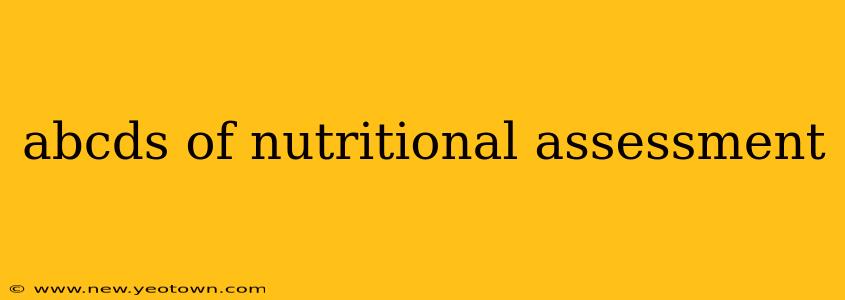We all know eating healthy is important, but how do you really know if you're getting the right nutrients? It's not just about feeling good; proper nutrition is the foundation of a healthy life, impacting everything from energy levels and immune function to long-term disease risk. This is where nutritional assessment comes in – a crucial process to understand your body's unique needs and tailor your diet accordingly. Let's delve into the ABCs of this essential practice.
What is Nutritional Assessment?
Nutritional assessment isn't just about weighing yourself on a scale. It's a comprehensive process that goes beyond simply counting calories. Think of it as a detective story, where we gather clues from various sources to paint a complete picture of your nutritional status. This involves analyzing your dietary intake, physical characteristics, and medical history to identify any potential deficiencies or excesses. This holistic approach helps us create a personalized plan to optimize your health.
The Key Components: A Deeper Dive
The process typically involves several key components, often referred to as the "ABCDEs" of nutritional assessment. Let's explore each one:
A – Anthropometric Measurements:
This is where the measuring tape and scale come into play. Anthropometric measurements include your height, weight, body mass index (BMI), waist circumference, and even skinfold thickness. These measurements provide valuable insights into your body composition, identifying potential issues like underweight, overweight, or obesity. For example, a high waist circumference can indicate a higher risk of heart disease and diabetes, even if your BMI falls within the "normal" range.
B – Biochemical Data:
This involves lab tests that analyze your blood and urine samples. These tests can measure levels of essential nutrients like vitamins, minerals, and proteins, revealing any deficiencies or excesses. For instance, a low hemoglobin level might indicate iron deficiency anemia, while high cholesterol might necessitate dietary changes. These tests provide objective data to complement the subjective information gathered from other assessment methods.
C – Clinical Examination:
A physical examination by a healthcare professional is another vital part. The doctor or registered dietitian will look for physical signs of malnutrition, such as dry skin, brittle hair, or swollen ankles. They might also assess your muscle mass and overall appearance, looking for any signs of wasting or excessive fat storage. This visual assessment provides crucial contextual information.
D – Dietary Assessment:
Understanding your eating habits is crucial. This involves a detailed analysis of your usual food intake, which might involve methods like food frequency questionnaires, 24-hour dietary recalls, or even food diaries. This helps identify potential nutrient imbalances, areas for improvement, and any problematic eating patterns. Accurate dietary recall is challenging, so multiple methods are often employed.
E – Environmental Assessment:
This often overlooked aspect considers your socioeconomic status, access to food, lifestyle factors, and cultural practices that impact your nutritional intake and overall health. For example, someone living in a food desert might have limited access to fresh produce, impacting their ability to maintain a healthy diet. Understanding these environmental factors is vital for providing truly effective nutritional guidance.
Frequently Asked Questions (PAAs)
How often should I have a nutritional assessment?
The frequency of nutritional assessments depends on several factors, including your age, health status, and risk factors for nutritional deficiencies. Some people may only need an assessment once or twice a year, while others may benefit from more regular check-ups. A healthcare professional can help determine the appropriate frequency for your individual needs.
What are the signs of poor nutrition?
Signs of poor nutrition can vary widely, but some common indicators include fatigue, weakness, weight loss or gain, hair loss, dry skin, brittle nails, and impaired wound healing. If you experience any of these symptoms, it's crucial to seek professional advice.
Is a nutritional assessment the same as a blood test?
No, a nutritional assessment is a much broader process that incorporates various methods, including blood tests. Blood tests provide biochemical data, which is only one piece of the puzzle in a complete nutritional assessment. The assessment combines blood work with anthropometric measurements, clinical examination, dietary history, and an understanding of your environment.
Who should get a nutritional assessment?
Nutritional assessments are beneficial for a wide range of individuals, including those with chronic diseases (diabetes, heart disease), pregnant or breastfeeding women, athletes, and individuals looking to improve their overall health and well-being. Even those feeling healthy can benefit from understanding their dietary habits and ensuring they meet their nutrient needs.
How can I find a qualified nutrition professional?
You can find a registered dietitian (RD) or registered dietitian nutritionist (RDN) through professional organizations or your healthcare provider. These professionals are qualified to conduct nutritional assessments and provide tailored recommendations.
By understanding the ABCs (and really, the ABCDEs) of nutritional assessment, you're taking a proactive step towards achieving optimal health and well-being. Remember that this is a personalized journey, and working with a qualified healthcare professional is key to developing a plan that's right for you.

